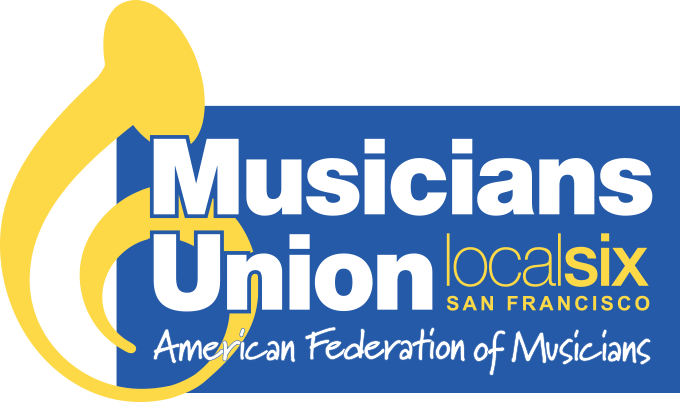Gordon Messick — Trombone: “I’m Proud Of My Career.”
by Alex Walsh
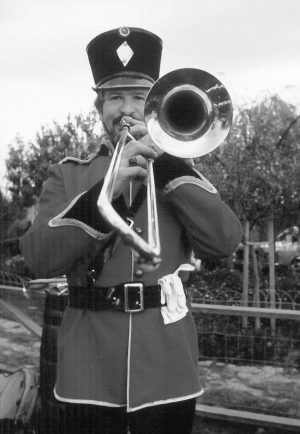 Photo used in the Standard Oil
Photo used in the Standard Oil
Educational Series of films on the history of music.
Gordon played on the soundtrack.
When Gordon Messick graduated from college, he decided to go to New York to see if he could make it in the music business. He had a friend, a bass player in the Les and Larry Elgart Band, who set him up with an audition. This was 1958, the end of the swing era. With his girlfriend’s encouragement, Gordon travelled to New York, auditioned at the Pennsylvania Hotel, and got the job. For the next year and a half, he worked on the road with the Les and Larry Elgart band, the Richard Malby band, and most notably, the Tony Pastor band.
“When I was on the road with Tony Pastor, we actually did one of the first rock and roll tours. Elvis had come on the scene, and rock and roll was becoming very popular. Someone figured out that they should have a big band, and a bunch of rock and roll people, go out on a tour. So they hired Tony Pastor’s band. We went on a tour with Bobby Darin, Jimmy Clanton, and Dion and the Belmonts, for three or four weeks. We could see the change at that point; it was right in front of our eyes. All of a sudden, you had 10,000 teenage girls screaming at these rock and roll guys. At first I thought, ‘this is just a passing fad.’ But, obviously, it was more than a passing fad.”
Although he toured constantly, Gordon maintained an apartment in Manhattan on the Upper West Side, a residence hotel with four roommates. But, just as his career was taking off, and he was starting to get local work, he got drafted.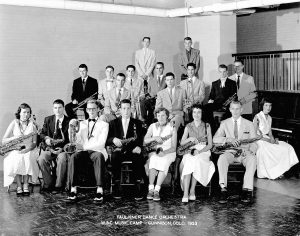
Gordon (2nd row center) at summer music camp,
Western State College, Gunnison CO, 1953.
“It totally bummed me out. Fortunately, I spent the next two years in army bands. That’s how I ended up in San Francisco.”
CHILDHOOD
Gordon Messick was born in 1935, in eastern Colorado, at the height of the Dust Bowl. He was the youngest of three boys. His father and grandfather were farmers and ranchers who grew wheat and raised cattle outside of Cheyenne Wells, a little town 15 miles from the Kansas border. The family had struggled for years during the Great Depression, and were soon wiped out by the Dust Bowl. “They had a couple thousand acres in all, and lost it all. They sold their last 5 carloads of cattle in Chicago for $5,000, deposited it in a bank in Cheyenne Wells on a Friday, and by Monday, the bank closed. That basically wiped them out. It really destroyed my family.”
His mother and father ended up divorcing, which was unusual for the times. The boys went with their mother to Monte Vista, Colorado, a small town of about 3500 people. “Fortunately, she had an education, so she could get a decent job. I had sort of a poverty stricken youth.” His mother remarried when Gordon was a teenager.
In elementary school, Gordon started on baritone horn. In 6th grade, his aunt bought him a trombone. “The high school band and choir were the center of the cultural universe In 1940s Monte Vista. I liked concert band music. That’s what was available, and that’s what I did. I played in the solo and ensemble contests every year. We were always very successful. We won state competitions—lots of blue ribbons. We were fortunate to have a wonderful teacher named Byron Syring. He was really quite inspirational. I also took private lessons from him. I was captivated, at that point, by having some success with music, and I wanted to continue.”
In the fall of 1953, Gordon went to the University of Colorado, Boulder, and majored in music education. “I thought I would become a music teacher. I wanted to be like Mr. Syring.”
In college, Gordon discovered jazz.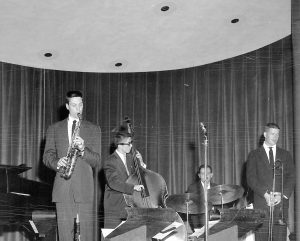
University of Colorado, 1957.
“A lot of guys were coming back from the Korean War, some really good players who really motivated me. The University of Colorado started a jazz band, but they didn’t want to use the word jazz, so they called it a dance band. I got interested in players like Carl Fontana, Frank Rosolino, and Chet Baker.” Gordon started working in combos and big bands on the weekends, mainly dances. “I worked in a dry cleaners before that, briefly–the only job I’ve had other than being a musician.”
In the summer of 1956, while in college, Gordon went on the road with a territory band named Tiny Hill. “He was booked out of Chicago, and they’d work in the mid-west. I joined the band in Wisconsin. We traveled in two black Packard limos. Tiny Hill weighed at least 300 pounds, and he always wore shades. Pulling into these little towns, it must’ve been striking, all these guys in black suits coming out of these big cars, looking like the mafia.”
PARADISE
Gordon was drafted in 1959. He went through basic training and military band training at Fort Dix, New Jersey. His girlfriend, Linda, drove out from Colorado to join him. They got married, and she lived with him near the base. After basic training, Gordon was stationed at Fort Rucker, Alabama, and then the 6th Army Band in the Presidio, San Francisco. The young couple rented a studio apartment near the base and settled into life in the Bay Area.
——————————————————————————————————-
“Did I hang out at Jones St.? Yes I did. When I came to San Francisco there was a bar in the basement of the union on Jones St. They had jam sessions there frequently, but it was kind of coming to an end at that point. They had lost their liquor license or something. Jones St. was definitely where I joined Local 6, and where I rehearsed a thousand times with rehearsal bands and shows. I have a fondness for Jones St.”
——————————————————————————————————-
“Having just come from Alabama, San Francisco was a paradise. The 6th Army Band was a really wonderful 50-piece band. I was playing every day, all day. During this time, I got to know pro trombone players in San Francisco, and got to know some rehearsal bands. Little by little I started making friends in the music business.”
By 1961, Gordon was out of the Army. He had intended to go back to New York, but that didn’t happen. His wife, a speech therapist, was now working for the Oakland schools, so they moved to Oakland.
Gordon joined Local 6 at this time, and soon had his first big break. “I’ve always been really lucky. I had a chance to go on the road with a Broadway show called Fiorello. They were going on the road for 6 weeks, then coming back to San Francisco to the Geary Theater for 6 weeks. I joined the show in Wichita Falls, Texas. That introduced me to the Broadway Show thing in San Francisco.”
Right after that show, Gordon was hired for Gypsy with Ethel Merman. “It was a part of the San Francisco Civic Light Opera, which doesn’t exist anymore. They put on 4 shows a year, 6 weeks each. Gypsy used 3 trombones, and actually ran for 9 weeks. On that success, I became a regular trombone player with the San Francisco Civic Light Opera, and for 5 years, I did most of those shows. It was a good basis for making a living in the early 60s.”
There was a wide variety of work to choose from at this time, including club work, private events, recording sessions, and industrial shows. Gordon became a regular player with the San Francisco Ballet, which had yearly work of about 10 weeks, including the Nutcracker, as well as the San Francisco Opera, as an added player. He also subbed occasionally with the San Francisco Symphony.
“It was an exciting time when there was all that work. I always tended to try and have a base, like theater work, but some guys made a really good living in the music business just freelancing. They never wanted to take a steady job because they were working two and three jobs a day, frequently. I was on the periphery of that.”
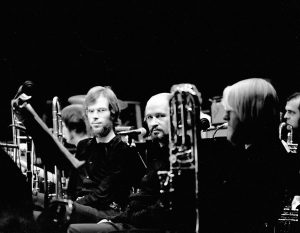
Circle Star Theater, late 1960s. From left:
Mike Heathman, Gordon Messick, Nick Tenbroek.
The Messicks had their first child, a son, in 1963, and their second, a daughter, in 1966, neither of whom pursued music professionally. “No one else in my family does music. There are now some nieces and nephews who have some talent, but they’re still quite young. I had a great, great grandfather who directed a military band in the Civil War, and some of my ancestors were singers. My grandfather on my mother’s side sang on the radio, which I think was not terribly unusual at that point, because all those small towns had a radio station. They would hustle up whoever could sing and had a decent voice. That’s going back to the previous generation in Kansas.”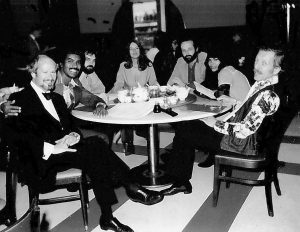
With members of the Petula Clark Tour, 1969.
CIRCLE STAR
In 1967, Gordon started a 10 year run working at the now defunct Circle Star Theater in San Carlos, where he could count on a steady salary for 35 weeks a year. “It was a great job. We had a really good orchestra. We played regularly with Frank Sinatra, Sammy Davis Jr., Lena Horn, all the Motown acts, Peggy Lee–all the Vegas type stars. It was great fun. I really enjoyed that job a lot.”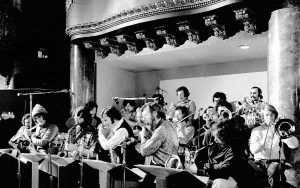
Monday Night band at the Great American Music Hall.
Gordon played many recording sessions. “Columbia Records Studio, Coast Recorders, Wally Heider’s Studios, those were all very busy with sessions. I played on the Standard Oil History of Music program. And jingles, that paid residuals–that became a significant part of my income.”
Gordon says he worked many casuals with Sly Stone before he became big as Sly and the Family Stone. “Sly was a very talented young man who knew how to write arrangements. We would do recordings, and oftentimes, they’d have these big extravaganzas at the Cow Palace and Oakland Auditorium. They would bring in a lot of rock and roll acts and have a house band to back them up for a day. We might play for 15 or 20 acts. They’d each come on and do one or two songs. I remember playing a show at the Cow Palace with Little Stevie Wonder when he was 13 years old. There were 15 or so acts, and he was the headliner. At the time, I have to admit, I thought this was sort of beneath me, but I later came to enjoy it.”
Up until the 1980s, industrial shows came to San Francisco on a regular basis. “Auto shows, that was always daytime work. You’d get a call to work from 8am to 5pm, doing different things. First, the presentation of the new automobile, then a luncheon, then a cocktail hour. It was really lucrative. IBM came in 3-4 days at a time, hiring musicians all day long. That was always great. I could do an industrial show during the day, then do a theater job at night.”
Gordon also subbed at Bimbo’s, and many other clubs in North Beach. “Bimbo’s was a steady job. There were 10 guys working there 7 nights a week, so I worked a lot. There were a lot of clubs on Broadway. A place called Mr. D’s had a big band backing up the same type of acts that came to the Circle Star. The Jazz Workshop was there, and Basin Street West. The Playboy Club was happening, but I did not work there.”
“I also worked as an added man at the hotels. I played the Venetian Room at the Fairmont quite a bit with Ernie Heckscher’s band. It was a 10 piece band, but very frequently they would add to it. When Tony Bennett and Ella Fitzgerald worked there, they both used large orchestras. The musical directors with those acts tended to know the musicians, and the same musicians tended to come back.”
In the mid-seventies, as headliners began to bring in their own self –contained bands, the Circle Star Theater became less predictable. About this time, the Shorenstein-Nederlander organization had come in to San Francisco and wanted to operate the theaters on a more fulltime basis. For the next twenty years, Gordon worked steadily at the Curran, Orpheum, and Golden Gate theaters. “Frank Barbaria was the contractor, then Wayne Allen. Wayne offered me a regular position, which I was happy to take.”
GIVING BACK
In the 1980s, Gordon was active in theater contract negotiations. “We spent a lot of time negotiating contracts to prevent synthesizers from displacing musicians in the pit. We were moderately successful, we slowed it down. In San Francisco, we used to have very strong contracts in the theaters, some of the best working environments in the industry. We had minimums that were required for Broadway shows, but which have gradually been eroded.” Gordon also worked to establish a Local 6 credit union. “I tried to get that off the ground for about 5 years. It didn’t last and eventually melded with the Local 47 credit union.”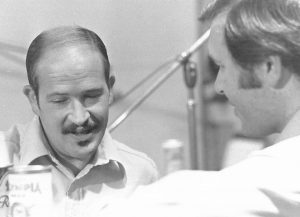
Gordon and Bill Perkins at Coast Recorders, mid 1960’s.
In 1991, the Pamphlet B touring show contract was rewritten to the detriment of local theater musicians. “Melinda Wagner and I were the initial impetus to see if we could do something about it. Along with David Schoenbrun, Artie Storch, and Larry Souza, we formed the Theater Musicians’ Association, a players conference within the AFM.” They had their first conference in 1994. Gordon served as President. “It was an international organization, with chapters in Vancouver and Toronto. TMA is going strong today with chapters in most major cities in the US. I’ve always tried to be a participant in the union. I think that the labor movement in general is very important to this country, and I’ve always been a big supporter of the Musicians Union, and continue to be. I’ve benefited from the pension, and making a decent wage. I’ve been involved in negotiating contracts and found it to be rewarding and fulfilling. Tough too, it’s hard to maintain decent contracts. It seems to be a never ending battle.”
Gordon retired from playing in 2002. “I worked until I was 67. I felt my skills were diminishing and I accepted it. It wasn’t a real crisis or anything. I’d had a long career, and I was proud of my career. I’ve been very fortunate to meet the people along the way who really helped me, (laughs) and gave me work.”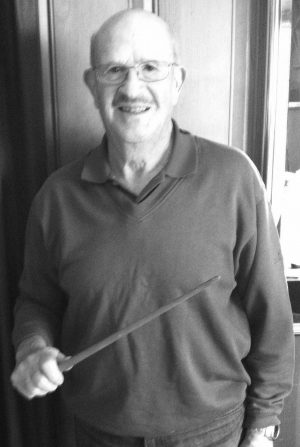
Gordon with his great, great grandfather’s baton.
“My grandmother sent me this letter along with the baton: ‘This baton, made by Grandfather Hill, was used by him for many years. Had he lived he would have been very proud of you, Gordon, for pursuing your natural talent in music…’”
